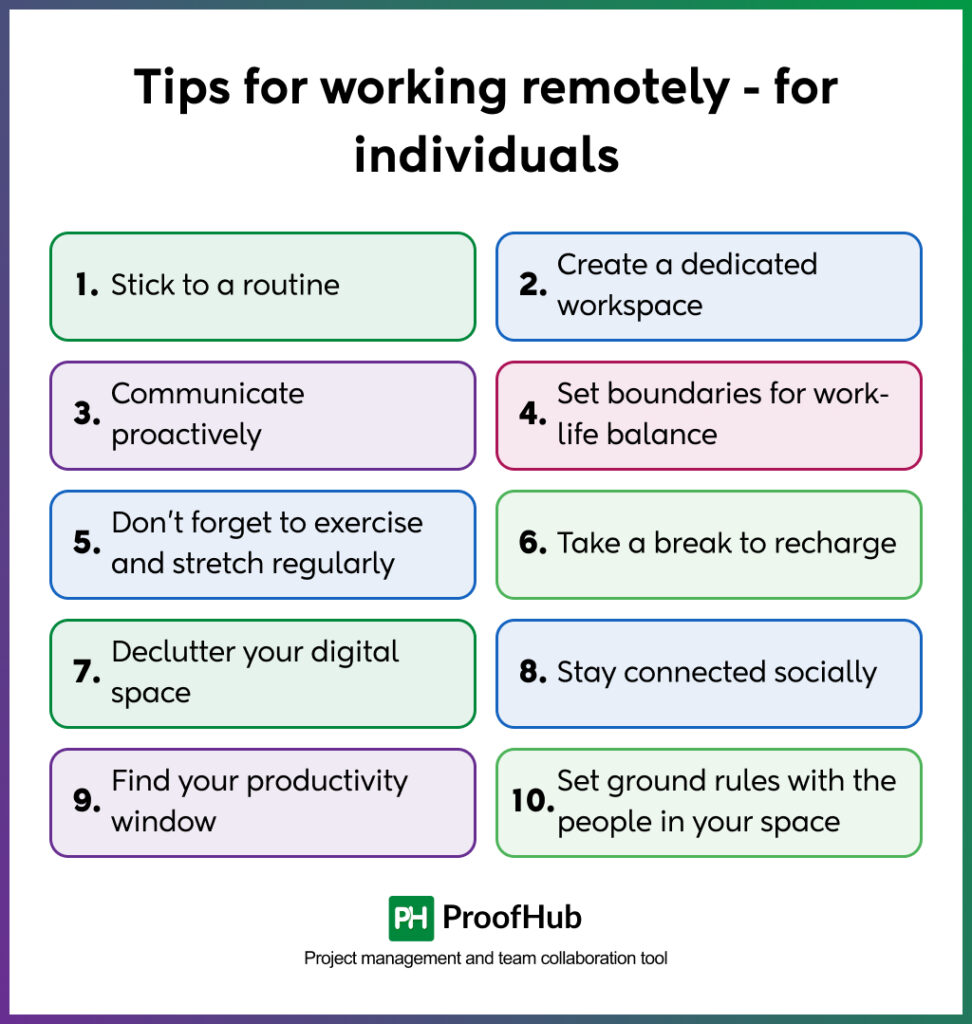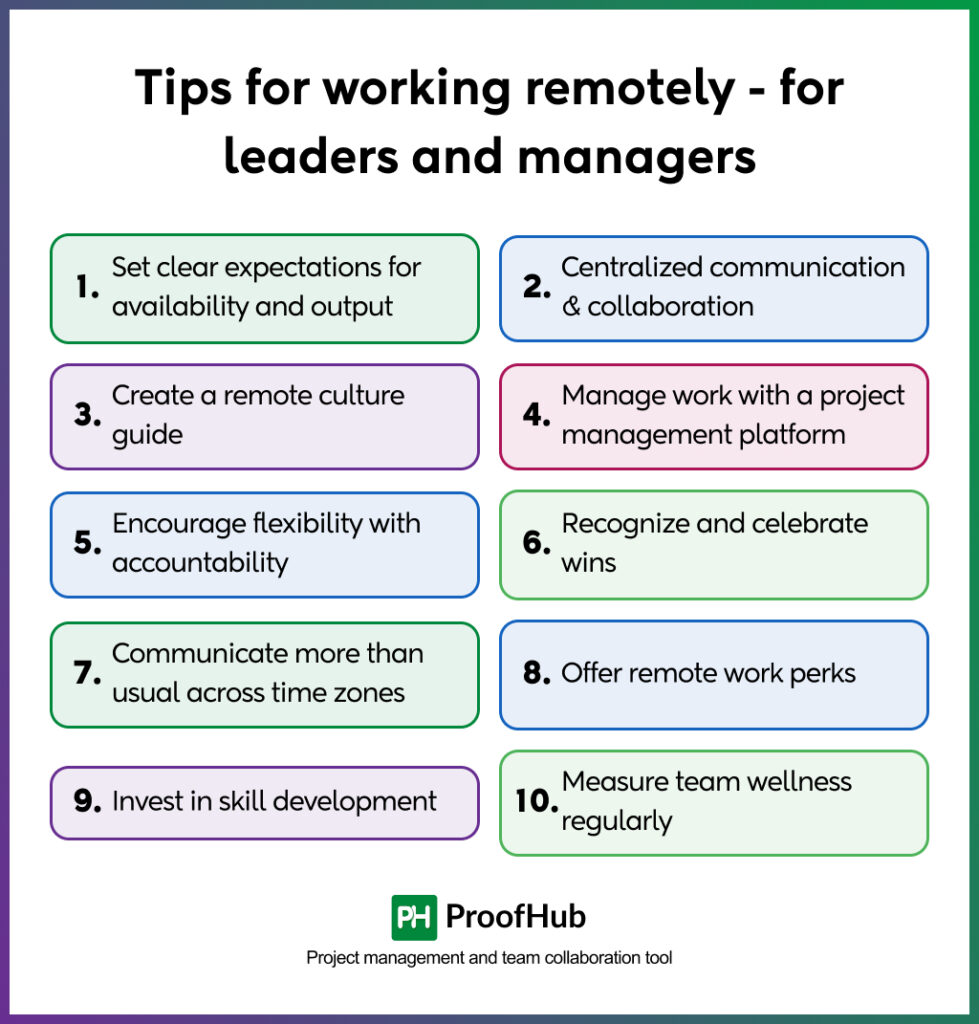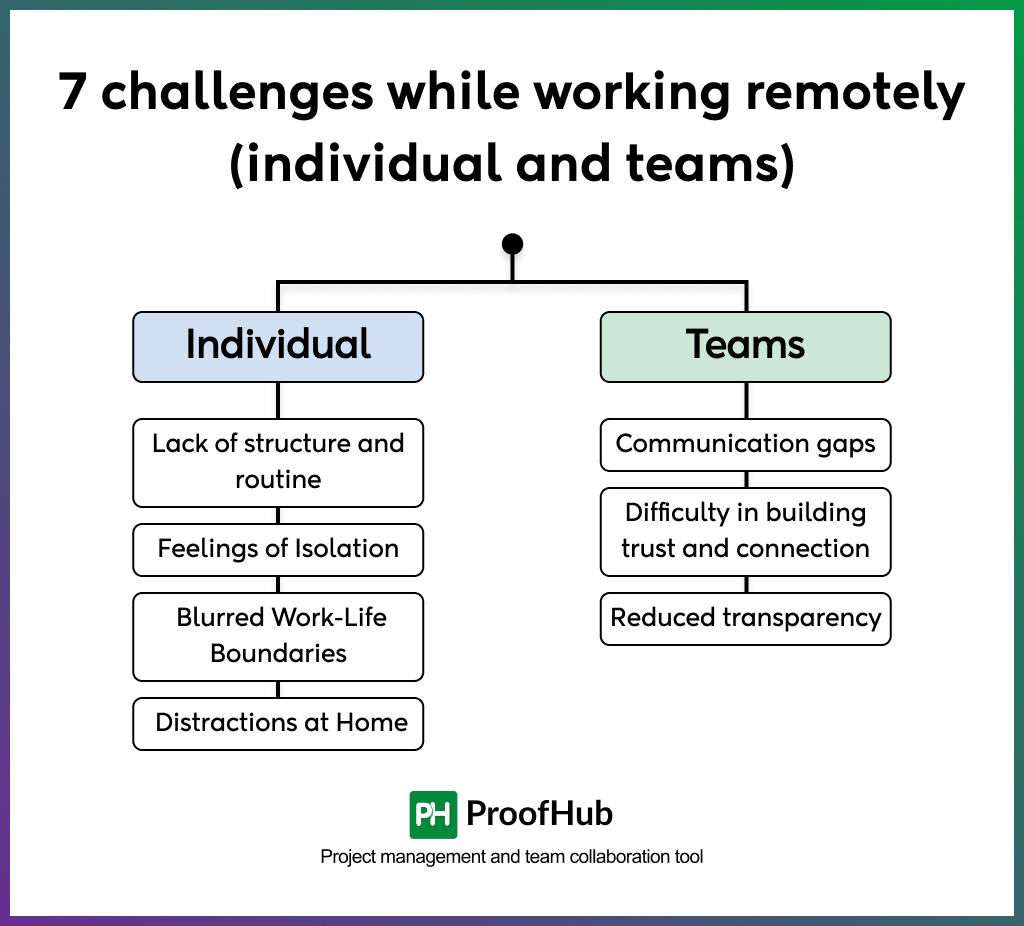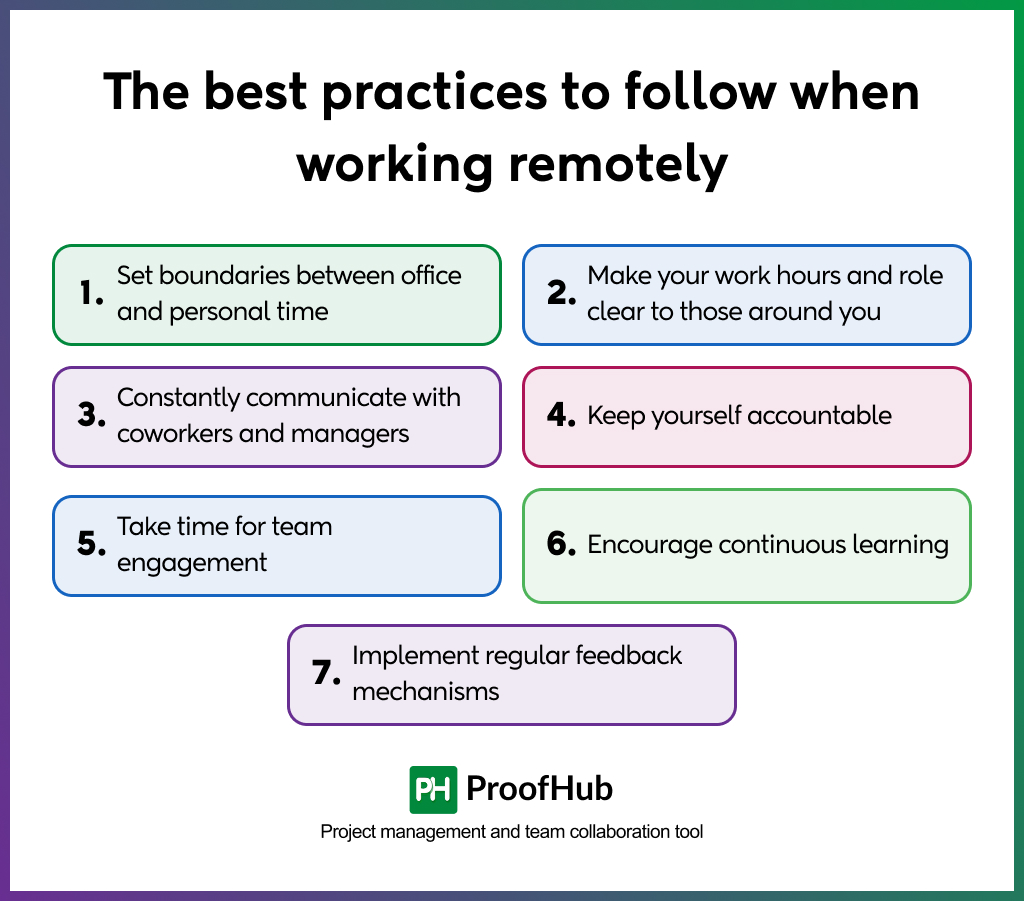You did it! Your team or you as an individual have embraced a remote job!
Remote work can truly be a blessing, but to succeed requires a whole new set of workplace management skills. You need to manage not just your tasks and time, but also how you communicate and collaborate with coworkers and supervisors who may be miles or time zones away. And if your job requires you to supervise others who are remote, then you must be an effective leader of your subordinates.
While these skills might come naturally in a shared office, things change when your team is distributed. Coordination becomes difficult. Building trust requires more effort. And staying visible without being physically present requires more strategic effort.
Luckily, information is power. The more you understand how remote work differs from traditional office life, the better prepared you’ll be to make the transition successful.
In this article, you will read some practical tips, common challenges, and proven best practices that empower both individuals and teams to succeed remotely.
What is remote working?
Remote working means performing your job from anywhere outside of a traditional office. Instead of commuting to a central location, you can work from wherever you feel most comfortable and productive, your home, a coffee shop, a coworking space, or even while traveling.
You might hear it referred to as work from home, telecommuting, or remote work. While the terms may vary, the concept is the same: completing your tasks and responsibilities without being physically present in your company’s main office.
Remote work isn’t a one-size-fits-all solution. It can be:
1. Fully remote
In a fully remote setup, the entire team works from different locations with no requirement to visit a physical office. Communication and collaboration happen through digital tools like video conferencing, messaging apps, and project management platforms like ProofHub.
2. Hybrid (WFH + In-office)
Hybrid work combines the flexibility of remote work with the structure of in-office collaboration. In this model, team members may visit the office occasionally for meetings, brainstorming sessions, or team-building activities while working remotely the rest of the time.
Tips for working remotely – for individuals

From my experience, creating a truly rewarding remote work environment doesn’t happen by chance. It takes intention, structure, and consistency. Here are 20 essential tips that have proven crucial in making remote work both productive and fulfilling.
1. Stick to a routine
You probably heard the quote of W.H. Auden, “Routine, in an intelligent person, is a sign of ambition.” That is definitely true in WFH.
Making a routine gives your day a structure. It helps you stay focused during work hours, feel less stressed, and enjoy more personal time. You will not just organize your day; you are building a clear boundary in your brain: “This is the focus time for the work,” and “Now it’s time to recharge.”
2. Create a dedicated workspace
It may be tempting to work from your bed or couch, but your productivity might take a hit because these spaces are often associated with rest, making it harder for your brain to switch to work mode.
Having an actual workspace boosts productivity compared to working from your couch or bed. It also helps create clear boundaries, allowing you to leave work behind at the end of the day.
3. Communicate proactively
Talk to your team regularly to keep work moving without delays. Share updates, raise any issues early, and make sure expectations are clear from the beginning. Whether it’s a quick check-in or a detailed update, open communication helps build trust and keeps everyone on the same page.
4. Set boundaries for work-life balance
Having clear boundaries between work and personal life helps you feel more relaxed, avoid burnout, and maintain better mental well-being. It allows you to fully enjoy your personal time, recharge effectively, and return to work with more energy, focus, and motivation.
5. Don’t forget to exercise and stretch regularly
Sitting for too long can make your body stiff and your mind tired. But when you move around during the day, you feel more awake, focused, and less stressed. Regular movement keeps both your body and mind fresh, so you can stay comfortable and do your best work all day.
6. Take a break to recharge
You have heard a quote by Mark Black “Sometimes the most productive thing you can do is relax.“ It’s true; I have also experienced the power of a break to stay focused.
For example, while writing this blog, I paused for a quick 5-minute walk and some little stretching. This short break cleared my mind and helped me return with better clarity. Small recharges like this can elevate your engagement, prevent burnout, and help you work smarter.
7. Declutter your digital space
Decluttering your digital space is just as important as tidying your physical desk. A clean, organized digital environment reduces mental clutter, helps you focus, and saves time hunting for files or switching between tabs.
8. Stay connected socially
Your work-from-home job can make you feel disconnected from coworkers and managers. However, staying socially connected helps you feel more supported, engaged, and part of the team, even when you’re working from a distance. Join virtual coffee chats, comment in team channels, or simply check in with a coworker.
9. Find your productivity window
Some people feel more productive in the morning, while others work better in the afternoon or evening. Pay attention to when your energy and focus are at their highest and schedule your most important tasks during that window. Knowing your natural rhythm helps you finish faster with fewer mistakes and a lot less frustration.
10. Set ground rules with the people in your space
When you work from home, it is important to set clear boundaries with others who share your space. This helps avoid unnecessary distractions and keeps your work time respected.
For example, if your kids are at home during your work hours, they need to understand what’s okay and what’s not while you’re working.
Tips for working remotely – for leaders and managers

For managers and team leads, working remotely means finding new ways to keep the team working well together, even without meeting in person. Here are some simple and useful tips to help you lead your remote team smoothly and keep everyone connected and productive.
11. Set clear expectations for availability and output
As a remote team leader, it’s important that everyone knows when they’re expected to be available, what their key responsibilities and deliverables are and how success will be measured. Clear expectations help your team stay aligned, reduce misunderstandings, and maintain steady progress even when working from different locations.
12. Centralized communication and collaboration
It is beneficial to set up a centralized communication platform where you can collaborate with your team. When conversations, files, feedback, and updates are scattered across tools or buried in email threads, productivity suffers.
From my experience, using a team collaboration tool like ProofHub makes this process much easier. It brings all communication and collaboration into one place. Whether it’s project discussions, task comments, announcements, or file sharing, everything stays organized and accessible. It helps the team stay on the same page without switching between tools or missing key updates.
13. Create a remote culture guide
A remote culture guide acts as a go-to reference that outlines how your team works together when not sharing the same physical space. It can include communication norms, working hours, tools used, meeting etiquette, response time expectations, and values that guide behavior. Having this in place helps everyone, especially new hires, understand how to collaborate effectively, feel connected, and stay aligned with the team’s rhythm and culture.
14. Manage work with a project management platform
Remote work thrives on clarity, and that starts with how work is organized. Instead of juggling between emails, chat apps, and spreadsheets, use one central project management platform like ProofHub to streamline everything. With these tools, you can assign tasks with clear deadlines and track progress through visual boards and Gantt charts.
15. Encourage flexibility with accountability
Remote work thrives when employees feel trusted. Let your team choose how they structure their workday as long as they meet goals, deadlines, and deliverables. When team members are given flexibility and held accountable, it builds ownership, motivation, and a strong sense of responsibility toward shared outcomes.
Also read: 11 Expert tips to boost accountability in remote teams
16. Recognize and celebrate wins
Remote teams can sometimes miss out on the energy of celebrations. Without a shared office space, small victories or big achievements can go unnoticed. That’s why it’s important to make an intentional effort to highlight accomplishments, whether it’s meeting a tight deadline, launching a project, or simply showing great teamwork.
17. Communicate more than usual across time zones
Remote work allows teams to be spread across different time zones, which brings flexibility but also delays in responses. When you’re not all online at the same time, every message matters. That’s why it’s important to communicate clearly and thoroughly and share all the necessary details upfront to avoid back-and-forth delays and keep work moving smoothly, even when teammates are asleep.
18. Offer remote work perks
When people get extra support while working from home, they feel happier and more motivated. Giving small benefits shows you care about their comfort and well-being, not just the work they do. This makes them feel valued, helps them stay focused, and builds a stronger team no matter where everyone is working from.
19. Invest in skill development
When you invest in skill development, you are not just building individual capabilities; you are strengthening the entire team. Whether it’s improving technical skills, leadership training, or mastering new tools, continuous learning helps employees feel valued and empowered. Let’s take a look at the tech giants and how they enhance the skills of their employees:
At Google, employees are encouraged to dedicate 20% of their workweek to focus on a project of their choice. This gives them the freedom to experiment and work flexibly in areas that interest them, which can be hugely motivating.
- Microsoft
Microsoft empowers its employees by providing continuous learning opportunities and fostering a culture built on a growth mindset. At its core, Microsoft believes that anyone can learn, grow, and adapt. This mindset fuels innovation and personal development across the organization.
As stated on Microsft’s empowering employees page:
“At Microsoft, we’re focused on bringing out the best in people, supporting their goals, and allowing them to find deep meaning in their work.”
- Amazon
Amazon’s “Career Choice” program pre-pays tuition and training costs for in-demand skills, even for remote roles. From cloud certifications to language courses, remote employees can access resources to build their future careers inside or outside the company.
20. Measure team wellness regularly
Sitting for a long time idle may cause health issues, so it’s crucial to monitor your team’s physical and mental wellness consistently.
For instance, at ProofHub, we encourage a culture of health by regularly tracking employees’ health as part of our voluntary wellness program to promote fitness awareness and support healthier lifestyle choices while working remotely.
7 Challenges while working remotely (individual and teams)

Remote work is a fundamentally different experience compared to working in person. While it offers flexibility and independence, it also comes with its own set of challenges. Here are the common challenges faced by both individuals and teams when working remotely:
Challenges faced by individuals while working remotely
1. Lack of structure and routine
One of the biggest challenges remote workers face is the absence of a fixed routine. Without the usual rhythm of commuting or office hours, it becomes harder to stay disciplined. Some people start late or get distracted easily, while others struggle to stop working and take proper breaks. Over time, this lack of structure can affect both productivity and personal well-being, making it difficult to maintain a healthy balance between work and life.
2. Feelings of Isolation
Working remotely means working alone.
While solitude can help you focus undisturbed, it can also make you feel isolated from other team members. The absence of day-to-day social interaction can lead to feelings of loneliness, disconnection, and decreased team spirit.
3. Blurred Work-Life Boundaries
When you work from home, it’s harder to keep work and personal life separate. Since your office is in your house, it can feel like you’re always working. You might keep checking emails or finishing tasks even after work hours, just because it’s easy to do. This can make it tough to relax, take breaks, or enjoy your personal time.
4. Distractions at Home
Working from home means you don’t have to deal with office noise or coworkers dropping by your desk for small talk. But home has its own set of distractions.
You might get interrupted by the doorbell ringing for a delivery or unexpected visits from relatives. If you have small kids, it’s even harder. They might not understand that just because you’re home doesn’t mean you’re free to play. Saying “not now” again and again can be frustrating.
It’s also tough to find a quiet place for video calls without someone walking in or making noise in the background.
Challenges faced by managers while working remotely
5. Communication gaps
As a manager, one of the biggest challenges I notice in remote teams is the absence of spontaneous, face-to-face interactions. In an office, quick desk conversations, hallway chats, or even casual coffee breaks help build relationships and resolve doubts quickly. In a remote setup, those moments are missing.
6. Difficulty in building trust and connection
When managing a remote team, I have seen how tough it can be to build real human connections. In the office, people bond over lunch or shared experiences—remote teams don’t get that naturally. Without this personal connection, it takes longer for trust to form, especially in new or distributed teams.
7. Reduced transparency
Remote work can make it harder for me, as a manager, to see what everyone is working on. It’s not about micromanaging but about staying aligned. Without regular check-ins or a shared workspace, it’s easy to lose sight of progress, priorities, or potential roadblocks. Team members might duplicate work, miss deadlines, or feel disconnected from the bigger picture—simply because they don’t know who’s doing what or why.
Also read: What are the pros and cons of working and managing remotely?
The best practices to follow when working remotely

Consider these seven practices for improving your productivity and consistency while working remotely:
Best Practices for Individuals
1. Set boundaries between office and personal time
When your home becomes your office, it’s easy for work and personal time to blend together. You should make them separate to reduce burnout, improve well-being, and make it easier to maintain both productivity and a healthy work-life balance.
How to Do it:
For example, if you decide to work from 9 AM to 6 PM, after 6 PM, switch off from work and shift your attention to personal time, spend it with your family, enjoy your hobbies, go for a walk, or simply relax.
2. Make your work hours and role clear to those around you.
Let people around you know what your working hours are and whether or not they can interact with you during that time. This helps avoid interruptions and creates mutual respect for your work schedule.
How to do it
- You can hang a “Do Not Disturb” sign during meetings or important tasks.
- Join a coworking space with like-minded professionals.
- Find a coffee shop with a reputation for accepting and encouraging remote workers.
3. Constantly communicate with coworkers and managers
Remote work requires you to be more deliberate about staying connected. Since you’re not physically visible, regularly sharing what you’re working on, your goals for the day, and any updates becomes essential. Clear and consistent communication helps build trust, keeps everyone aligned, and ensures nothing slips through the cracks.
How to do it:
- Share brief updates on your tasks and progress regularly.
- Be proactive, ask questions when unclear, and inform others of any delays or blockers.
- Use remote work tools like ProofHub for quick daily check-ins, team discussions, and streamlined communication.
4. Keep yourself accountable
Without a manager nearby, it’s easy to lose track of time or tasks. Staying organized is key. You have to stay focused and accountable to manage your work and time.
How to do it:
- Create a daily to-do list and track your time using simple tools like timers or apps.
- Block time on your calendar for important tasks and review what you’ve completed at the end of the day to stay on track and motivated.
Best Practices for Managers and Leaders
5. Take time for team engagement
Remote teams can easily become disconnected without intentional efforts to stay connected. As a manager, investing time in team engagement boosts morale, strengthens team bonds, and reduces feelings of isolation. An engaged team is more motivated, collaborative, and resilient.
How to support it:
- Host regular virtual check-ins to keep communication open and casual.
- Celebrate birthdays, milestones, or team wins to create a sense of belonging.
- Organize light, informal virtual hangouts to unwind and build rapport beyond work tasks.
6. Encourage continuous learning
In a fast-changing work environment, encouraging ongoing learning helps your team stay skilled and adaptable. Teams that continue to learn to stay innovative, motivated, and better prepared to take on new challenges.
How to support it:
- Share helpful resources like e-books, courses, templates, or internal knowledge sessions.
- Promote knowledge-sharing within the team by highlighting wins and lessons from completed projects.
- Pair junior members with experienced ones for mentorship and practical learning.
7. Implement regular feedback mechanisms
A healthy feedback loop is essential for team growth and alignment. It helps resolve minor issues before they become big problems and creates a culture of transparency and trust.
How to support it:
- Hold consistent one-on-one check-ins to discuss progress, concerns, and goals.
- Use quick pulse surveys or anonymous tools to gather honest input from the team.
- Encourage open peer-to-peer feedback to promote continuous improvement.
Also read: Giving feedback remotely: STRICT Do’s and Don’ts
Bottomline
Remote work offers flexibility, but without the proper structure, that freedom can lead to confusion, missed deadlines, and scattered communication. Success in a remote setup depends on these things: clear responsibilities, open communication, and the right tools to bring everything together.
That’s where ProofHub makes a real difference.
ProofHub gives remote teams a central place to plan tasks, track progress, and communicate without needing to switch between multiple applications. From assigning work to setting deadlines to tracking progress and sharing updates, it keeps everyone connected, focused, and moving in the same direction.
Frequently asked questions
What are the best tools for remote teams?
ProofHub is always here to support remote work and also solve the challenges of remote work efficiently. It is all-in-one project management and team collaboration software that brings all your tasks, collaboration, and files into one place. Moreover, built-in chat, discussion, mentions, and comments help the remote team to connect with the team no matter where they are working.
What are the benefits of working remotely?
Remote work comes with a range of benefits. First, it gives you the freedom and flexibility to plan your day based on your energy levels, personal commitments, and focus hours. You also save money by cutting out expenses like fuel, public transport, or parking more money in your pocket every month.
Plus, you’re no longer tied to one place; you can work from a peaceful hill station, your hometown, or even your favorite café. You can take breaks when needed, enjoy meals with loved ones, and skip the office drama—all while staying productive.
How do I ensure career growth in a remote role?
To ensure career growth in a remote role, you need to be intentional and proactive. Start by setting clear career goals—know what you want to achieve and break it down into smaller milestones. Stay visible by regularly communicating your progress with your manager and contributing to team discussions.

